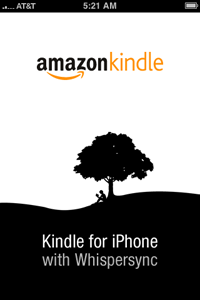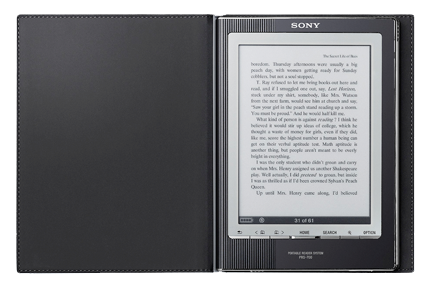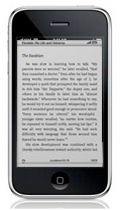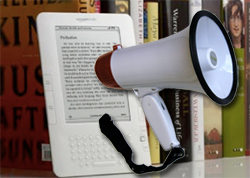 I’m pleased–but not surprised–to report a happy ending to the tale of Eucalyptus, the iPhone e-reader that had been rejected from the iPhone App Store on the grounds that it could be used to download and read the Kama Sutra. Today, developer Jamie Montgomerie got a call from an Apple representative, and all was resolved. An uncensored version of Eucalyptus is now available from the App Store. (I won’t say anything snarky about Apple here–if you’ve made a mistake, it’s far better to correct it than to dig in your heels.) The iPhone already had an embarrassment of e-reader riches, but Eucalyptus is a welcome addition, with one of the prettiest, most functional user interfaces to date on any iPhone app.
I’m pleased–but not surprised–to report a happy ending to the tale of Eucalyptus, the iPhone e-reader that had been rejected from the iPhone App Store on the grounds that it could be used to download and read the Kama Sutra. Today, developer Jamie Montgomerie got a call from an Apple representative, and all was resolved. An uncensored version of Eucalyptus is now available from the App Store. (I won’t say anything snarky about Apple here–if you’ve made a mistake, it’s far better to correct it than to dig in your heels.) The iPhone already had an embarrassment of e-reader riches, but Eucalyptus is a welcome addition, with one of the prettiest, most functional user interfaces to date on any iPhone app.
Tag Archives | E-books
Kindle for iPhone Gets Good (Not Perfect, But Good)
 Amazon.com, whose first pass at putting Kindle e-books on the iPhone was simultaneously amazing and disappointing, has released a new version of its iPhone app. It’s still not the ultimate iPhone e-reader, but it sh0ws welcome influence from the excellent Stanza (recently bought by Amazon).
Amazon.com, whose first pass at putting Kindle e-books on the iPhone was simultaneously amazing and disappointing, has released a new version of its iPhone app. It’s still not the ultimate iPhone e-reader, but it sh0ws welcome influence from the excellent Stanza (recently bought by Amazon).
Four new features make it worth checking out, and one of them is important enough to turn iPhone Kindle from an app I almost never user to one I’ll use frequently when I have time to kill.
9 comments
5Words for May 8th, 2009
 Saw Star Trek, expected Tribbles…
Saw Star Trek, expected Tribbles…
How to research: copy Wikipedia!
Stardates for your Google Calendar.
SugarSync adds a free version.
2 comments
Eight Reasons I'm Going to Miss Books
[NOTE: Here’s a post that first appeared in our free T-Week newsletter, which you can subscribe to here.]
 So help me, I’m in favor of progress. I grew up loving magazines and feel blessed to have spent a large chunk of my life to date working on them, but when they go away, I’ll be okay with it. Most of the things that magazines do well, the Web does even better, and the inherently interactive nature of the Internet lets it do an array of things that are simply impossible for paper magazines. As for newspapers–well, they’re already dead to me.
So help me, I’m in favor of progress. I grew up loving magazines and feel blessed to have spent a large chunk of my life to date working on them, but when they go away, I’ll be okay with it. Most of the things that magazines do well, the Web does even better, and the inherently interactive nature of the Internet lets it do an array of things that are simply impossible for paper magazines. As for newspapers–well, they’re already dead to me.
Books, however, are different. Them, I don’t want to disappear–ever. I own and like Amazon’s Kindle, but if I had to choose between it and printed books, I’d opt for the latter in a nanosecond. Even so, the Kindle is already good enough to leave me thinking that it’s pretty much inevitable that printed books will begin to look archaic within the next decade. Once something starts to look archaic, it usually becomes archaic. So I’m thinking that by the time 2019 rolls around there will be a lot fewer books and a lot fewer bookstores, and, perhaps, a lot fewer book authors.
3 comments
Another New E-Book Platform? Please, No, Stop It!
![]() TheStreet.com is reporting that book-retailing behemoth Barnes & Noble may be hatching a plan to build an e-book device of its own, possibly partnering with Sprint to deliver books wirelessly. I don’t know if there’s anything to the rumor, but it would be stunning if B&N wasn’t formulating some sort of strategy for dealing with the prospect of a world in which most (all?) books are digital. If it doesn’t, it’ll turn into another Blockbuster sooner or later.
TheStreet.com is reporting that book-retailing behemoth Barnes & Noble may be hatching a plan to build an e-book device of its own, possibly partnering with Sprint to deliver books wirelessly. I don’t know if there’s anything to the rumor, but it would be stunning if B&N wasn’t formulating some sort of strategy for dealing with the prospect of a world in which most (all?) books are digital. If it doesn’t, it’ll turn into another Blockbuster sooner or later.
If there is a Barnes & Noble e-reader, it’ll have plenty company. There’s Plastic Logic’s upcoming device. Fujitsu is about to release its fancy FLEPia in Japan. Magazine publisher Hearst is working on an e-reader. Rupert Murdoch is making noises about jumping into the market. And then there are the gadgets that are already here: Amazon.com’s Kindle 2, Sony’s Reader, and dark horses such as the iRex iLiad.
All of which leaves me thinking one thing: I wish that the publishing and technology industries would take a deep breath, step back, and declare a moratorium on new e-book gizmos and platforms until they can agree on one file format for e-books that’ll work on every reader. It would be nice if that format was free of copy protection, but I’m willing to settle for DRM as long as it works well, and works with everything,
The books I’ve bought for my Kindle will work on the Kindle and other devices Amazon chooses to support, such as the iPhone. (Which means that even if another company comes up with a gadget that’s ten times better than the Kindle, I’m unlikely to switch,) The books Sony sells work on Sony’s reader. We don’t know what formats a Barnes & Noble e-reader will work with, but I’m guessing it doesn’t want Amazon or Borders selling tomes for its hardware. And so on.
One of the multiple wonderful things about human eyeballs is that they’re compatible with everything you can look at: I’ve got books I’ve owned since I was two that I still pull out from time to time. But e-books that are tied to a particular platform are dead ends: You’ll be lucky if you can still read them five years from now, let alone a few decades into the future.
I cheerfully admit that I’m pretty much ignorant when it comes to what’s going on with open e-book standards. I just know that I’m not going to get too excited about any new e-reader until I know that any digital book or magazine I buy anywhere will work on it…
18 comments
Sony Cozies Up to Google to Fight Amazon
 No doubt Sony is beginning to feel the heat from Amazon. While its Sony Reader was on the market much longer than Amazon’s Kindle has been, in the short time Amazon’s device has been with us it has taken the e-book world by storm.
No doubt Sony is beginning to feel the heat from Amazon. While its Sony Reader was on the market much longer than Amazon’s Kindle has been, in the short time Amazon’s device has been with us it has taken the e-book world by storm.
Suddenly Sony is finding itself in a position it probably would rather not be in: take on Amazon directly or risk being relegated to also-ran status against its growing competitor.
Well, the first move in what will probably be a multi-step response is a partnership with Google. Sony will initially offer about 500,000 copyright-free books for its device that have been scanned by Google’s book search service.
Reader users would also be happy to hear all these titles would be made available for free. Most of Kindle’s titles are priced at $9.99 and above.
As per copyright law, Google will not be able to offer full versions of books that still have copyright. However, its collection before 1923 would be made available to the Sony Reader.
With these new books, the Reader would catapult past the Kindle for most titles available. Amazon only offers about 250,000 books, but has taken the business model of offering only the most popular and current titles. Sony would have about 600,000 titles available after Google’s digitized library is added.
Is this a good move? It remains to be seen. One thing that Sony has going for it is the fact that it can be sold internationally fairly easy. The Kindle uses CDMA technology, which is rarely used outside of the North American continent.
While the Reader needs to be tethered to a computer to download books, it can do this anywhere. Sony could exploit this weakness to its advantage if it so desired. Amazon, you might want to start considering a GSM version, no?
3 comments
The T-Grid: Kindle for iPhone vs. Kindle 2
 Until early last week, there was one Kindle e-reader–the original one. Now there are two: Amazon’s Kindle 2 and the app for the iPhone and iPod Touch which the company released last night. They have one huge thing in common: 240,000 electronic books, mostly going for ten bucks apiece. And beyond that, the two Kindles have remarkably different sets of upsides and downsides. After the jump, we’ll compare and contrast.
Until early last week, there was one Kindle e-reader–the original one. Now there are two: Amazon’s Kindle 2 and the app for the iPhone and iPod Touch which the company released last night. They have one huge thing in common: 240,000 electronic books, mostly going for ten bucks apiece. And beyond that, the two Kindles have remarkably different sets of upsides and downsides. After the jump, we’ll compare and contrast.
12 comments
Kindle for iPhone: Disappointing. Yet Still Amazing.

Despite everything, it’s a delight to have Kindle on the iPhone. What makes Kindle Kindle isn’t software as much as it is content–240,000 books’ worth of it, by far the largest collection of e-books ever assembled. Getting access to those books on a phone is by far the biggest deal in content for Apple devices since Apple itself added moves and TV shows to the iTunes Store. And given that there are far more iPhones and iPod Touches on the planet than Kindle devices, this could be a bigger moment for electronic books than the introduction of the Kindle in 2007 was.
28 comments
Yup, Your iPhone Can Be a Kindle, Too–Starting Now
 It may not have been inevitable, but it was a darn good idea–and it’s extremely cool to learn it’s reality, not just wishful thinking. Starting tomorrow, Amazon.com will be distributing a free iPhone application that puts Kindle e-books on the phone, giving owners of Apple’s handset access to by far the most comprehensive source of commercial published works. Not only will books you’ve bought for a Kindle be available on the iPhone, too, but stuff like your location within a tome will travel between Kindle and iPhone (a feature Amazon calls Whispersync).
It may not have been inevitable, but it was a darn good idea–and it’s extremely cool to learn it’s reality, not just wishful thinking. Starting tomorrow, Amazon.com will be distributing a free iPhone application that puts Kindle e-books on the phone, giving owners of Apple’s handset access to by far the most comprehensive source of commercial published works. Not only will books you’ve bought for a Kindle be available on the iPhone, too, but stuff like your location within a tome will travel between Kindle and iPhone (a feature Amazon calls Whispersync).
What a win-win-win-win situation–it’ll be a boon for people who own both a Kindle and an iPhone, for people who own just an iPhone, and for Amazon and Apple. I can’t imagine that Amazon will lose a single sale of Kindle hardware because iPhones can double as Kindle readers–if you want to read dozens or hundreds of pages at a sitting, you’ll want the large screen and marathon battery life of a Kindle device. But the iPhone makes more sense when you’re out and about, sans Kindle, and want to kill a few minutes by dipping into a book.
You gotta think that Amazon may end up selling not only more Kindle books–the number of Kindle-compatible gizmos in the world will skyrocket tomorrow–but also more Kindle readers, since some iPhone owners will be more likely to spring for a reader once they’ve bought and enjoyed books on their phone.
I imagine everyone will take the fact that Apple okayed the Kindle application for the iPhone as evidence it’s not getting into the e-book biz itself. Probably. But not definitely. For one thing, I’m not sure if even Apple would nix an application in a market it hadn’t yet entered unless it clearly violated it developer agreement. For another, is it utterly unthinkable that Apple might come out with a jumbo iPod Touch for which book-reading was one significant application…and work with Amazon, who has more knowledge and contacts relating to books than Apple could ever develop, to sell the content?
[UPDATE: It’s available–if you’ve got iTunes, click here and you’ll go to the app. More soon…]
[UPDATED UPDATE: Here’s my review.]
7 comments
The Author's Guild is Wrong About the Kindle. And That's Okay. They're the Authors.
 When it comes to thorny matters of intellectual property, my instinct is often to follow a philosophy which, as far as I can tell, almost nobody else shares. It’s a sort of creators’-rights libertarianism which you might call Let the People Who Create Stuff Make Their Own Damn Mistakes. (Possible alternative moniker: Reverse Lessigism.) The recording industry may have made almost every wrongheaded decision imaginable during the first decade 0f digital music, but hey–they’re entitled to drive their business into the ground if they so choose. And who the hell is is anyone else to angrily tell someone who created something what he can or can’t do with it?
When it comes to thorny matters of intellectual property, my instinct is often to follow a philosophy which, as far as I can tell, almost nobody else shares. It’s a sort of creators’-rights libertarianism which you might call Let the People Who Create Stuff Make Their Own Damn Mistakes. (Possible alternative moniker: Reverse Lessigism.) The recording industry may have made almost every wrongheaded decision imaginable during the first decade 0f digital music, but hey–they’re entitled to drive their business into the ground if they so choose. And who the hell is is anyone else to angrily tell someone who created something what he can or can’t do with it?
Ultimately, I think most owners of intellectual property will eventually come to decisions that serve the people who watch, listen to, or read their works, since behaving too stupidly for too long will leave you without any customers. But it’s OK by me if creators find their own comfort level, even if it’s different from what I’d choose.
